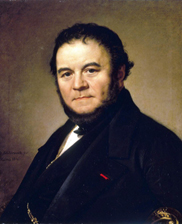
The French writer Stendhal (real name Marie Henri Beyle) was born in Grenoble on January 23, 1783. The son of a lawyer, he was brought up in the family of his grandfather, who encouraged his love of literature. When Stendhal was thirteen, he was sent to the Central School in Grenoble, where he excelled particularly in mathematics. He was encouraged to study further as an engineer at the Ecole Polytechnique in Paris. Stendhal arrived there in 1799, the day after the coup d'etat that made Napoleon the ruler of France.
A distant relative named Daru, who later became secretary of state, secured for the young man an ecclesiastical post at military headquarters. The job was too boring, and the next year the young Henri, who had barely turned seventeen years old, having received the rank of sub-lieutenant, was sent to Italy, where at that time was the French army.
After retirement, he engaged in self-education, attended theaters and literary circles. Then he returned to the army, and as intendant of Napoleon's troops, traveled almost all over Europe. After 1814 he went to Italy, where he became friends with J. Byron. From 1821 he lived in Paris, and cooperated with the French and English press. In 1830 he became French consul in Trieste, then in Civitavecchia, where he spent the last decade of his life.
Stendhal's first works were devoted to music, which he called his "strongest" passion. In the works "Rome, Naples, Florence" (1817), "Vie de Rossini" (1824) aesthetic tastes and sympathies of the writer expressed most definitely.
Later Stendhal developed a view of art as a means of reflecting and cognizing reality, acting as a brilliant popularizer of art (The History of Painting (1817), "Vanina Vanini" (1829), "Rome, Naples and Florence" (1817), etc.
In 1822 Stendhal published his treatise De L'Amour, an experience of psychological analysis enriched with personal experiences and observations.
During Stendhal's lifetime his works were recognized by a few people, including O. Balzac, J. W. Goethe, P. Mérimée, A. S. Pushkin and L. N. Tolstoy. The reappraisal of Stendhal's works occurred only in the second half of the nineteenth century.
Stendhal died in Paris on March 22, 1842. In 1933, a museum of the writer was opened in Grenoble.
ОМК, Yerassyl Mekezhanov

